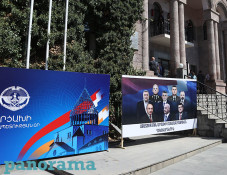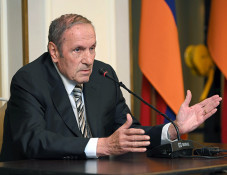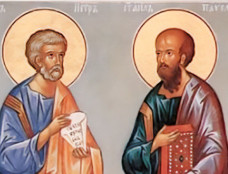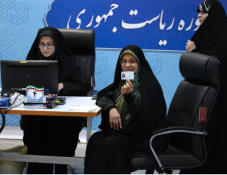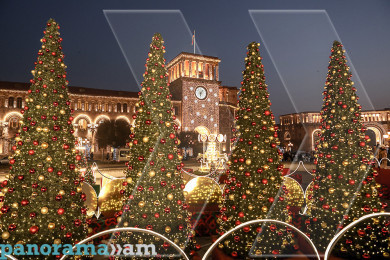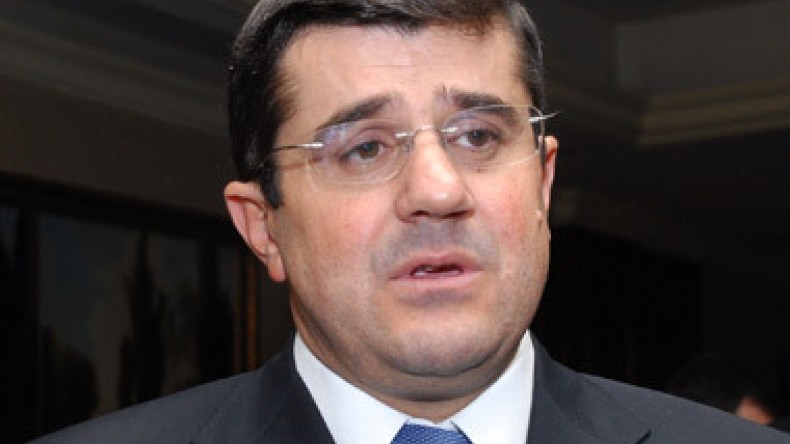
NKR PM: We all need to work toward recognition of Karabagh
On May 2, Armenian Weekly Assistant Editor Nanore Barsoumian discussed with with Nagorno Karabagh Republic (NKR) Prime Minister Ara Haroutyunyan in his Stepanakert office the challenges facing the young republic. The full text of the interview is below.
Thank you for this opportunity. First, I want to ask you about Karabagh’s domestic politics, and then discuss regional issues.
In regards to domestic issues, of course Karabagh is a young republic, only 20 years old, and it still doesn’t have a state-building tradition. However, it already has a direction; it has chosen the principles of democracy. We are moving ahead with those principles. The government is being shaped by the will of the people, expressed through elections. The most fundamental achievement is our steadfast and firm march towards state-building. We have many domestic issues, social problems, and problems with infrastructure. After the Soviet years, and the devastation of the war, we have inherited a tattered economy, and we face the challenge of reviving that economy—in fact, not only reviving it, but bringing it up to step with the scientific and technological developments of the day. Solving these problems requires large financial resources. We are moving ahead step by step. Every year new construction projects are completed, but we still have a long way to go. We consider the development of our economy as the most important issue of the day, as it will also provide a way for us to solve other problems.
Regionally, little has been accomplished. There is no political progress with Azerbaijan, although negotiations are ongoing. Azerbaijan is not ready for a compromise. And as far as we are concerned, one-sided compromises will never happen. That is why the status quo has been maintained by force until today. Of course, ceasefire violations continue. When faced with gunfire from the Azeri side, we respond. Broadly speaking, however, peace has reigned for some years now, and I am convinced that this will continue.
Despite Aliyev’s jingoistic language and the increase in the government’s weapons procurement?
Yes, despite all that. We know that Aliyev’s announcements are first and foremost for internal consumption. The Azeri leadership and the international community realize full well the devastation that could be caused by renewed conflict in the region, as well as the unpredictable consequences of the resumption of hostilities, which is why I am convinced that we won’t have another war. As far as weapons procurement is concerned, we are not falling behind. Armenia’s and Artsakh’s defense armies are equipped with the required weapons and ammunition to maintain the status quo. We never fall back. We just don’t talk as much about it. Our level of preparedness is in no way less than that of the Azeri armed forces.
Going back to the domestic issues, how is the state of the villages in Karabagh? I have been told during my interviews here that rural migration and urban drift, especially to Stepanakert, are problems.
I agree. That problem exists throughout the world, including Karabagh, where the youth prefer life in the cities. However, measures must be taken so that the youth stay—especially because those villages are the embodiment of our fundamental achievements. They constitute the first line of defense against a multitude of challenges. What are we doing about this? We are trying to create a conducive environment for the development of our rural economy…through increased construction and modernization in rural areas, so that villages become more self-sufficient.
Talk about the budget allocations to different projects.
Funds are invested in all sectors. We invest in infrastructure: on building roads, schools, kindergartens, houses, and hospitals. We are working in all directions, but unfortunately, we face serious financial challenges.
The Azeri government has launched an aggressive worldwide campaign on the “Khojali genocide.” What measures have been taken to counter these efforts?
Of course this issue concerns not only us, but also Armenia and the diaspora. We need to struggle against this together. Lobbying plays a central role in international diplomacy; we have our diaspora, Azerbaijan has money. Various countries have interests in Azerbaijan. If in the past we had the upper hand and broader reach through our diaspora, then today Azerbaijan’s financial resources have closed the gap. Azeri resistance and political activism has become palpable in different countries. First and foremost, we need to redouble the efforts of the diaspora. Also, by joining forces, we need to produce and disseminate information to counter Azeri propaganda. We absolutely need to wage this struggle together. I am convinced that with every passing year this struggle will only become harder, and we are going to rely more heavily on political activism in the Armenian Diaspora.
Turkey and Azerbaijan are also trying to harness their diasporas…
Yes, and not only their diasporas. Their wealth allows them to buy support.
It was recently reported in the news that Israel wishes to attack Iran through Azerbaijan. What would that mean for Karabagh?
Any war in this region will have a negative impact not only on Karabagh, but the region as a whole. War is not desired. Instability in the region—whether economic, social, or otherwise—is not desired. The likelihood of such a scenario is slim. They all realize that Iran is one of the more powerful states in the region. It has a large army, and a guiding ideology. The issue needs to be solved through negotiations. Iran is not an easy morsel to swallow. It is a few thousand-year-old civilization, and it has always been one of those countries that has a say, has an impact.
What factors would influence a solution to the Karabagh issue?
First and foremost it is dependent on the will of our people. Of course, there are interests involved. Major powers are attempting to formulate a solution to the Karabagh issue. But if their proposals are not satisfactory to us, they won’t get anywhere. Azerbaijani oil plays a role. The Russian influence is also a factor. U.S. interests play a part, as do Georgian-Azeri relations. And Iran. Ultimately, however, the solution is dependent on our people, and the people of Azerbaijan. Where we stand and what we envision are paramount.
And what solution do you envision?
The solution will very much resemble the current status quo. That’s how I envision it. However, time and a generational shift are necessary for people to come to terms with the status quo, and accept it.
What about the recognition of NKR?
Recognition will come, but it is not a matter of 5 or 10 years. To accomplish it, we need to have a strong economy, a unified nation: Armenian Diaspora, Armenia, and Karabagh. We all need to work toward the recognition of Karabagh, and I am convinced that we will be successful.
Newsfeed
Videos








